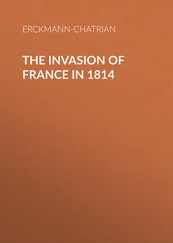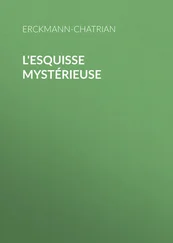Erckmann-Chatrian - Brigadier Frederick, The Dean's Watch
Здесь есть возможность читать онлайн «Erckmann-Chatrian - Brigadier Frederick, The Dean's Watch» — ознакомительный отрывок электронной книги совершенно бесплатно, а после прочтения отрывка купить полную версию. В некоторых случаях можно слушать аудио, скачать через торрент в формате fb2 и присутствует краткое содержание. Издательство: Иностранный паблик, Жанр: foreign_antique, foreign_prose, на английском языке. Описание произведения, (предисловие) а так же отзывы посетителей доступны на портале библиотеки ЛибКат.
- Название:Brigadier Frederick, The Dean's Watch
- Автор:
- Издательство:Иностранный паблик
- Жанр:
- Год:неизвестен
- ISBN:нет данных
- Рейтинг книги:3 / 5. Голосов: 1
-
Избранное:Добавить в избранное
- Отзывы:
-
Ваша оценка:
- 60
- 1
- 2
- 3
- 4
- 5
Brigadier Frederick, The Dean's Watch: краткое содержание, описание и аннотация
Предлагаем к чтению аннотацию, описание, краткое содержание или предисловие (зависит от того, что написал сам автор книги «Brigadier Frederick, The Dean's Watch»). Если вы не нашли необходимую информацию о книге — напишите в комментариях, мы постараемся отыскать её.
Brigadier Frederick, The Dean's Watch — читать онлайн ознакомительный отрывок
Ниже представлен текст книги, разбитый по страницам. Система сохранения места последней прочитанной страницы, позволяет с удобством читать онлайн бесплатно книгу «Brigadier Frederick, The Dean's Watch», без необходимости каждый раз заново искать на чём Вы остановились. Поставьте закладку, и сможете в любой момент перейти на страницу, на которой закончили чтение.
Интервал:
Закладка:
Erckmann-Chatrian draw strength from mother-soil. Their stories are laid in Alsace-Lorraine, or at least it is that debatable land whence the characters go only to return for the peaceful denouement, which these authors, in the good old-fashioned style, like to offer their readers. The popularity of such writers brings us back, happily, to that untechnical valuation of literature which insists, first of all, in regarding it as an exposition of human experience. Their books bear translation especially well because there is something in them besides incommunicable flavours of style, though style is not wanting; namely, vital folk, vivid scenes, significant happenings. Theirs is the misleading simplicity of method and manner which hides technique of a rare and admirable kind. Allowing for all exaggeration for altered ideals in fiction, and for the waning of interest in the historical circumstances which they portray, there remain such elements of permanent appeal as to give their books far more than a transient worth.
For more than forty years, Erckmann-Chatrian wrote as one man; their collaboration was, in effect, a chemical union. No example in literature better illustrates the possibility of the merging of individualities for the purposes of artistic unity. The double work of the English Besant and Rice is by no means so important nor do they stand and fall together in the same sense; much of Besant's typical fiction being produced after his partner's death. In the case of the most famed collaboration of older days, that of the dramatists Beaumont and Fletcher, the union was more intimate. But the early death of Beaumont, the consideration that he wrote less than half the plays conventionally attributed to their joint authorship, and the additional consideration that some of the best and most enjoyable dramas associated with these great names — The Loyal Subject , to mention but one – are unquestionably of Fletcher's sole composition, make the Beaumont-Fletcher alliance not so perfect an example of literary collaboration as is offered by Erckmann-Chatrian. When Chatrian died in 1890, it was as if, for literary purposes, both died. Their work had a unity testifying to a remarkable if not unique congeniality in temperament, view and aim, as well as to a fraternal unity which – alas! the irony of all human friendships – was dispelled when their quarrel, just before the death of Chatrian, put an end to an association so fruitful and famous.
From the very nature of fiction in contrast with drama, it would seem as if collaboration in stage literature were more likely to yield happy results than in the case of the novel. Here, however, is an example setting aside a priori reasoning; seemingly "helpless each without the other," the final breach in their personal relations would seem to have written Finis to their literary endeavour. Yet Erckmann survived for nearly a decade and wrote military stories, which in tone and temper carried on the traditions of the two men. But we may easily detect in this last effort the penalty of their literary severance: the loss of the craftsmanship of Chatrian was a loss indeed. Nor is this subjective guess-work of the critic; Erckmann himself described nearly twenty years ago the respective parts played by the two in their literary work. He declared that after a story had been blocked out and thoroughly talked over between them, he did all the actual composition. Then was it Chatrian's business to point out faults, to suggest, here a change in perspective, there less emphasis upon a subsidiary character, or here again, a better handling of proportion – in short, to do all the retouching that looks to artistry. And Erckmann goes on to testify in good set terms how necessary his collaborator was to the final perfected form of the story; how much it must have suffered without his sense of technique. It would appear from this that the senior member of the firm did what is commonly called the creative work of composition, the junior filling the role of critic. From France one hears that Erckmann was very German in taste and sympathy ( mirabile dictu! in view of so much of what he wrote); Chatrian, French to the core, a man who insisted on residing on the French side of the national line, who reared his sons to be French soldiers; whereas Erckmann in later years hobnobbed with the Germans, members of his family, in fact, inter-marrying with his ancient enemies.
Indeed, this last act of their personal history has its disillusionment. But after all, men shall be judged in their works. Whatever their private quarrellings, their respective parts in literary labour, their attributes or national leanings, the world, justly caring most in the long run for the fiction they wrote, will continue to think of them as provincial patriots, lovers of their country, and Frenchmen of the French, not only in the tongue they used, but in those deep-lying characteristics and qualities which make their production worthily Gallic in the nobler implication of the word.
RICHARD BURTON.
BIOGRAPHICAL NOTE
The celebrated friends who collaborated for fifty years under the title of ERCKMANN-CHATRIAN were natives of the department of the Meurthe, in Alsace-Lorraine . ÉMILE ERCKMANN was born at Phalsbourg (now Pfalzburg), on the 20th of May, 1822. His father was a bookseller; his mother he lost early. He was educated at the grammar school of Phalsbourg, and was a boarder there, growing up an intractable and idle boy. At the age of twenty Erckmann went up to Paris to study law, but he was inattentive to his work, and positively took fifteen years to pass the necessary examinations; having done so, he made no further rise of his profession. When he was twenty-five he suffered from a serious illness, and during his convalescence, in Alsace, he turned his attention to literature. At this moment there had arrived in Phalsbourg; as an usher in the grammar school, a young Alsatian , ALEXANDRE CHATRIAN, of Italian descent, who was born at Soldatenthal, near Abreschwiller, on the 18th of December, 1826, and who was destined for the trade of glass-worker. He had been sent in 1844, as an apprentice, to the glass-works in Belgium, but had, in opposition to the wish of his parents, determined to return and to be a schoolmaster in France.
Erckmann and Chatrian now met, and instantly felt irresistibly drawn to one another. From this time until near the end of their careers their names were melted indissolubly into one. In 1848 a local newspaper, "Le Démocrate du Rhin," opened its columns to their contributions, and they began to publish novels. Their first great success was "L'Illustre Docteur Mathéus" in 1859, which appeared originally in the "Revue Nouvelle," and which exactly gauged the taste of the general public. This was followed by "Contes Fantastiques" and "Contes de la Montague," in 1860; by "Maître Daniel Rock," in 1861; by "Contes des Bords du Rhin" and "Le Fou Yégof" in 1862; "Le Joueur de Clarinette" in 1863; and in 1864, which was perhaps the culminating year of the talent of Erckmann-Chatrian, by "Madame Thérèse," "L'Ami Fritz" and "L'Histoire d'un Conscrit de 1813." These, and innumerable stories which followed them, dealt almost entirely with scenes of country life in Alsace and the neighbouring German Palatinate. The authors adopted a strong Chauvinist bias, and at the time of the Franco-German War their sympathies were violently enlisted on the side of France.
In 1872 Erckmann-Chatrian published a political novel which enjoyed an immense success, "Histoire du Plébiscite"; in 1873, "Les Deux Frères", and they concluded in many volumes their long romance "Histoire d'un Paysan." Two of the latest of their really striking romances were "Les Vieux de la Vielle," 1882, and "Les Rantzau," 1884. During this period, however, their great vogue was the theatre, where in 1869 they produced "Le Juif Polonais," and in 1877 "L'Ami Fritz," two of the most successful romantic plays of the nineteenth century, destined to be popular in all parts of the world. After the war of 1870-'71 Erckmann lived at Phalsbourg; which was presently annexed to German Lothringen, and he became a German citizen; Chatrian continued to reside in Paris, and remained a Frenchman. For a long time the friends continued to collaborate on the old terms of intimacy, though at a distance from one another, but a quarrel finally separated them, on a vulgar matter of interest. Erckmann claimed, and Chatrian refused, author's rights on those plays which bore the name of both writers, although Chatrian had composed them unaided. The rupture became complete in 1889, when the old friends parted as bitter enemies. Chatrian died a year later, on the 4th of September, 1890, from a stroke of apoplexy, at Villemomble, near Paris. Erckmann left Phalsbourg, and settled at Lunéville, where he died on the 14th of March, 1899. The temperament of Erckmann was phlegmatic and melancholy; that of Chatrian impetuous and fiery. They were strongly opposed to the theories of the realists, which assailed them in their advancing age, and they stated their own principles of literary composition in "Quelques mots sur l'esprit humain," 1880, and its continuation "L'Art et les Grands Idéalistes," 1885. For a long time their popularity was unequalled by that of any other French novelist, largely because their lively writings were pre-eminently suited to family reading. But they never achieved an equal prominence in purely literary estimation.
Читать дальшеИнтервал:
Закладка:
Похожие книги на «Brigadier Frederick, The Dean's Watch»
Представляем Вашему вниманию похожие книги на «Brigadier Frederick, The Dean's Watch» списком для выбора. Мы отобрали схожую по названию и смыслу литературу в надежде предоставить читателям больше вариантов отыскать новые, интересные, ещё непрочитанные произведения.
Обсуждение, отзывы о книге «Brigadier Frederick, The Dean's Watch» и просто собственные мнения читателей. Оставьте ваши комментарии, напишите, что Вы думаете о произведении, его смысле или главных героях. Укажите что конкретно понравилось, а что нет, и почему Вы так считаете.












